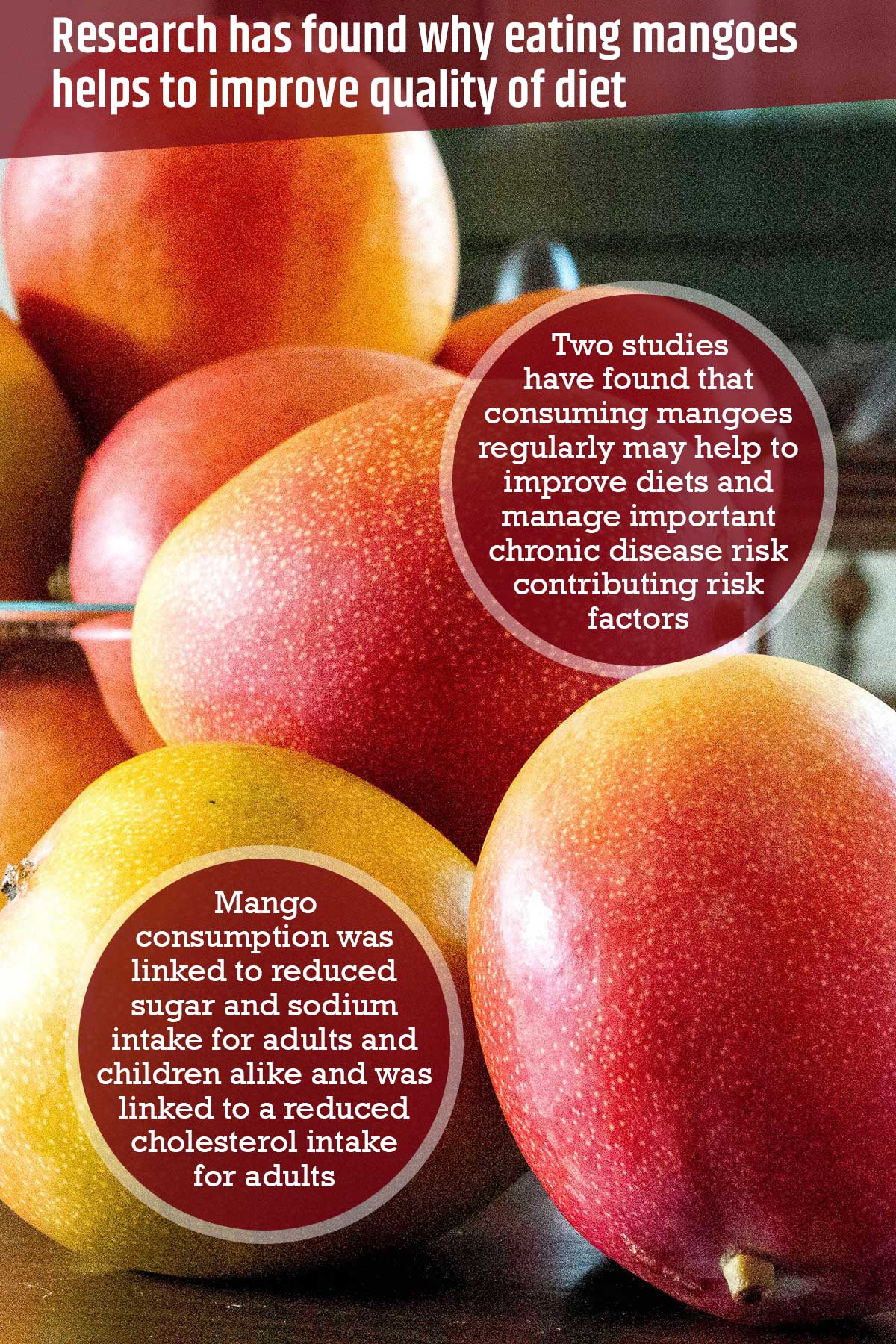Two studies have found that consuming mangoes regularly may help to improve diets and manage important chronic disease risk contributing risk factors.
The result of one of these studies suggests that consuming mangoes is linked to better overall quality of diet and nutrient intake that many adults and children are lacking at optimum levels.
The results of the other study indicate that snacking on mangoes may help with improving glucose control and inflammation reduction in comparison to other sweet snacks.
Consuming mangoes is linked to improved quality of diet and better nutrient intakes of concern in adults and children
An observational study saw positive results in nutrient intakes, diet quality, and health outcomes related to weight in people who eat mangoes as opposed to individuals who don’t.
The study made use of NHANES 2001-2018 data for comparing the diets and nutrient intakes of individuals consuming mangoes to those who didn’t eat mangoes.1✅ JOURNAL REFERENCE
DOI: 10.3390/nu14010059
The study revealed that children regularly eating mangoes had higher intakes of vitamins that help boost immunity such as A, C, and B6, and also potassium and fiber.
Potassium and fiber are 2 of the 4 “nutrients of concern” as specified by the Dietary Guidelines for Americans, meaning a lot of Americans aren’t getting enough of these nutrients.
The study revealed similar results for adults, indicating that consumption of mangoes was linked to significantly greater daily potassium and fiber intake as well as vitamins A, B12, C, E, and folate, an important vitamin for pregnancy and fetal development.
Mango consumption was linked to reduced sugar and sodium intake for adults and children alike and was linked to a reduced cholesterol intake for adults.
The study results reveal that both adults and children consuming mangoes tend to have a considerably better quality of diet overall together with higher potassium and fiber intakes in comparison to those not eating mangoes.
Snacking on mangoes is linked to improved glucose control and reduced inflammation
The other study examined mango’s role as a snack and discovered that eating whole mangoes as a snack in comparison to a control snack yielded better health benefits in adults who were obese or overweight.
Considering 97% of American adults eat snacks contributing to as much as 24% of their daily calorie intake, this study set out to make a comparison between 100 calories of fresh mango snacked every day to low-fat cookies snacked that were equivalent in calories.2✅ JOURNAL REFERENCE
DOI: 10.1016/j.numecd.2021.11.001
There were 27 obese or overweight adult participants in the study with no reported health conditions. They received either low-fat cookies or mango as a snack while their normal diet and level of physical activity were maintained for 12 weeks, with the alternating snack received for an additional 12 weeks following a wash-out period of 4 weeks.
The effects on insulin, glucose, liver function enzymes, lipid profiles, and inflammation were measured. Results showed after the study had ended that consumption of mangoes improved glycemic control and inflammation was reduced.
There wasn’t any drop in blood glucose when individuals snacked on low-fat cookies. There was however a statistically significant reduction in blood glucose levels when snacking on mangoes at 4 weeks and again at 12 weeks, although there was twice as much (naturally occurring) sugar in the mangoes in comparison to the cookies.
Significant improvements to C-reactive protein, total anti-oxidant capacity, and inflammation markers were also observed when snacking on mangoes. C-reactive protein is a biomarker made use of for measuring inflammation in the body.
Total anti-oxidant capacity is an overall antioxidant capacity measurement, or the efficiency of foods to prevent cell oxidation. The study indicates that the abundance of antioxidants in mangoes offers more protection against inflammation in comparison to the cookies.
The study results indicate that polyphenols, fiber, and antioxidants abundant in mangoes could help to offset consumption of sugar and help with glucose control and that antioxidants could also provide protection against inflammation.



